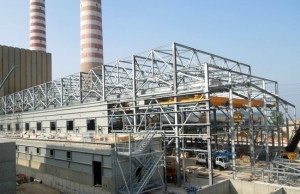Sanctions relief may enable Iran energy help
BEIRUT: Over the past five years, Iran has repeatedly offered assistance to Lebanon’s troubled energy sector, from building power plants and dams to rehabilitating oil refineries. While none of these offers have come to fruition, the expected gradual lifting of U.S. sanctions on Iran may present a fresh opportunity for the two countries to move forward together on energy deals.
“Legally speaking, it wasn’t easy to deal with Iran on energy or other areas of cooperation [suggested by Iran], whether military or infrastructure. It was always at the rhetorical level or the signature of an MOU [Memorandum of Understanding] because of the legal sanctions,” said Mona Sukarrieh, co-founder of Beirut-based political risk consultancy Middle East Strategic Perspectives.
“I think the legal sanctions were a very convenient excuse also because there are political obstacles,” she told The Daily Star, referring to “the major political divide between March 8 and March 14.” There has been “more of a general reluctance [from pro-March 14 factions] toward Iran-anything, rather than specifically energy.”
With the upcoming lifting of sanctions, “it is going to be much harder now to justify automatically rejecting cooperation with Iran,” she said. Moreover, the “energy sector, unlike other more sensitive areas of cooperation [such as military], is a good starting point.”
Energy is a critical component of all services and industries, from bakeries to ports, noted Roudi Baroudi, CEO of Doha-based energy consultancy Energy and Environment Holding, whose clients include the Lebanese government. He told The Daily Star that if political factions put their differences aside and focused on the country’s economic development, energy “would definitely be a very nice sector to work on.”
Cesar Abou Khalil, an adviser to the energy minister since November 2009, downplayed the effect of sanctions. “Has it ever been because of sanctions that things didn’t work out in energy projects? No not to my knowledge,” he told The Daily Star.
As an example, Abou Khalil said the Energy Ministry had rejected Iran’s gift of a power plant in Zahrani because its technological capabilities fell short of the requirements as set out under the 2010 Policy Paper for the Electricity Sector. The ministry wanted tri-fuel turbines that could be fueled by gas oil, natural gas, or fuel oil, but Iran could only provide turbines fired on the first two sources. “Since we don’t have gas, we would have had to run these turbines on gas oil, which was very very costly at that time.”
The countries signed three energy-related MOUs on oil, water and electricity during then-Iranian President Mahmoud Ahmadinejad’s visit to Beirut in October 2010. They have not moved forward with them, Abou Khalil said, citing constant upheaval in the government. “In Lebanon we spent more than a year forming governments since then. … We spent many months either forming a government or with the resigned prime minister during the Mikati government.
“Lebanon is open to cooperation with all friendly countries,” Abou Khalil emphasized, “[and] Iran is a friendly country.
“If [Iranian] companies have the technology required and they have the best offers at the time, I don’t see why the ministry or the administration or any agency of the Lebanese government would have a problem with that,” he added.
When asked which areas Iran was well-suited to help with, Abou Khalil said it was “very well-equipped in the oil and electricity sectors.”
Sukkarieh and Baroudi echoed that electricity is the most feasible energy subsector for Lebanese cooperation with Iran.
For the time being, it looks unlikely that Iran can export energy to Lebanon. Transporting gas – which must be transported by pipelines, or liquefied and carried in tankers – is unfeasible, given that it must pass through war-torn Syria and Iraq. Currently, there are no pipelines connecting Lebanon with Iran. The Iran-Iraq-Syria gas pipeline announced in 2011 that may have extended to Lebanon and Europe has yet to materialize.
Oil, though simpler to handle, must still be transported via tankers. Sukkarieh also noted that feasibility studies have found that it would not make economic sense to rehabilitate Lebanon’s two oil refineries, given how small and outdated they are.
Two years ago, the National Iranian Drilling Corporation – the only Iranian applicant – failed in the first prequalification round for participating in Lebanon’s long-delayed offshore oil and gas exploration licensing. Sukkarieh said it “wouldn’t be far-fetched to imagine an Iranian company applying to prequalify, more likely as a non-operator” in a second prequalification round under discussion.
Baroudi said Iran is well-equipped to assist Lebanon with onshore exploration and drilling. However, he said Iran is not capable of dealing with offshore “unless teamed-up with major oil and gas firms from the West or Far East.”
The Iranian Embassy in Beirut accepted written questions from The Daily Star, but did not respond by the time of publication.
“I wouldn’t expect Iran to be confrontational in its approach; it would be counterproductive,” Sukkarieh said. “The Iranians are more likely to diversify their business partners in the country, whether Lebanese or non-Lebanese, and will seek to initiate projects that will be perceived as benefitting the county and not just a particular segment of society.”
